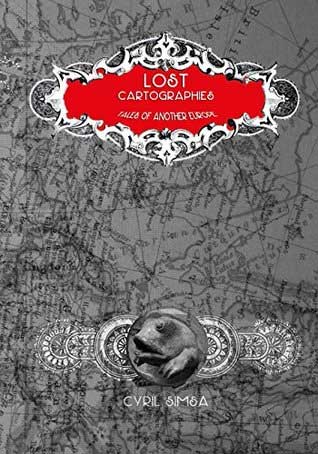
Book Review of:
‘LOST CARTOGRAPHIES: TALES OF ANOTHER EUROPE’
by CYRIL SIMSA
(Invocations Press, 2014) ISBN 978-0-9568021-7-0. 152pp
https://www.facebook.com/Invocations-Press-298769363552867/
Humans are a migratory species. Always have been. Yet we define ourselves in terms of ‘the other’. We are tribal. ‘It is a curious thing, how nations pick up a reputation with their neighbours for possessing certain quirks of behaviour and morés.’ They are objectified, or idealised. They are more noble than we. Or more savage. Or both. They become the noble savage. In an increasingly homogenously globalised world these post-colonial differences become less apparent. Yet beneath the multicultural veneers the old fears, suspicions and archetypes still lurk like vestigial organs. In the six stories that define Simsa’s ‘Lost Cartographies’, characters are motes in timelost lands, their tread disturbing the sedimentary voice of primordial fossils laid down by geological eras, ‘dim echoes of long-extinct life-stories and evolutionary narratives, from the Upper Pleistocene to the far-flung dying future of a (HG) Wells or a (William Hope) Hodgson.’
Cyril Simsa is a name familiar through the pages of various small-press manifestations (as well as ‘Foundation’ and ‘Locus’), a British writer of weirdly unsettling fictions. Of Czech descent, he now lives and works in Prague, to the extent that geographical margins are printed into his DNA. And he embodies strangeness in these unique and curious tales as one inhabits a second skin. He writes in the arch antique style of the Bram Stoker novel he uses as first touchstone, yet its immaculately florid curlicues enhance and never once detract from its immense readability. Geologist and New Woman Rosamund Harper alternates voices of rich resonance with 912-year-old Hieronymus Zibrt. Retracing the plotlines of every Gothic exploit from name-alike Jonathan Harker through the Hammer retakes on Transylvania, where the coach flips a wheel in the mountain vastness and she seeks hospitality in the ancient ruins of a medieval fastness. Simsa spins poetic mythologies that span centuries, redolent with the ‘strong harsh stench of sweat and blood and wood smoke.’ The movement, the plot development, the action, is embedded in the dialogue as a fossil trilobite is embedded in stone. Here, vampirism is a random Darwinian mutation that gifts the tragedy of immortality, a genetic affliction of the order of haemophilia or polydactyl. And the most impossible of affections that occurs between Rosamund Harper and Hieronymus Zibrt exists within the addiction metaphor of the unliving as well as the undead, condemned by ‘the curse of their biology to dwell forever on the fringes of creation.’ It’s a passing literary tempest located in the Hungarian Carpathians.
Simsa is strong with the weave of female voices, the way women use wily intelligence to dance free of social gender repression, as Mareliese Travendamp barters metaphysics with the Angel of Death in another gentle manifestation of a myth-figure. While the assistant librarian at the Hans-Paul Manor, outside the slowly spreading stain of Prague, where the nineteenth-century had skipped a few valleys, finds a gateway to the other world on the far side of the pond-waters, and is entranced by Leocadia, the Vila spirit who dwells there. It’s an island outside time given added poignancy by being poised on the brink of the Great War in which the savage ‘other’ will rip the old world order apart forever. Or the folk-memories of “On The Feast Of Stephen”, where a pagan ritual manifests pre-human revenants in the Czech Great Blanik forests, waking the sleeper-primordial of national legend which turns out to be a Cro-Magnon pandemic reversing the overpopulation-plague of Climate Change.
Humans are a migratory species. Even when ideological borders are enforced across a divided Eastern Europe, the supernatural “Queen Of Sumava” and the smuggler community confounds Comrade Colonel Judita Skuhrava’s dialectical materialism. Even when the post-apocalypse “Poorly Formulated Questions” assumes familiar configurations, in a dialogue in which the Trump-like former-President defends his policy of staunching the migratory tide in the face of melting ice-caps and rising sea-levels.
In this other new-found Europe of ‘Lost Cartographies’ every stone is awash with the archaic noises of wood-sprites, rock-demons, and the will-o’-wisps that hover over the marsh at sunset. Cyril Simsa has a distinctive perception. His is a unique highly-personalised vision, which alters the reader’s way of seeing the world too, re-attuning it to the eternal pulse of the land.
BY ANDREW DARLINGTON
